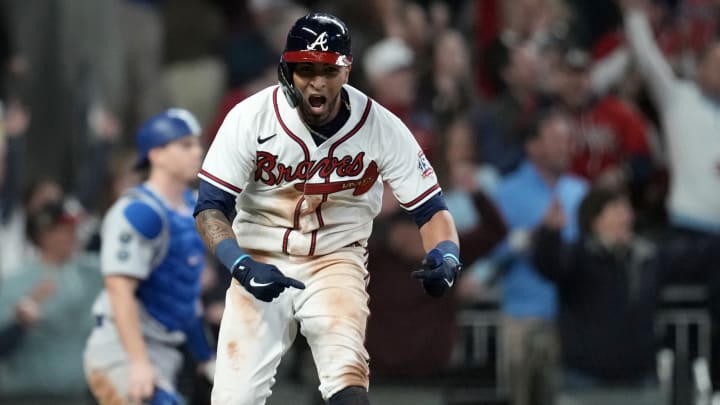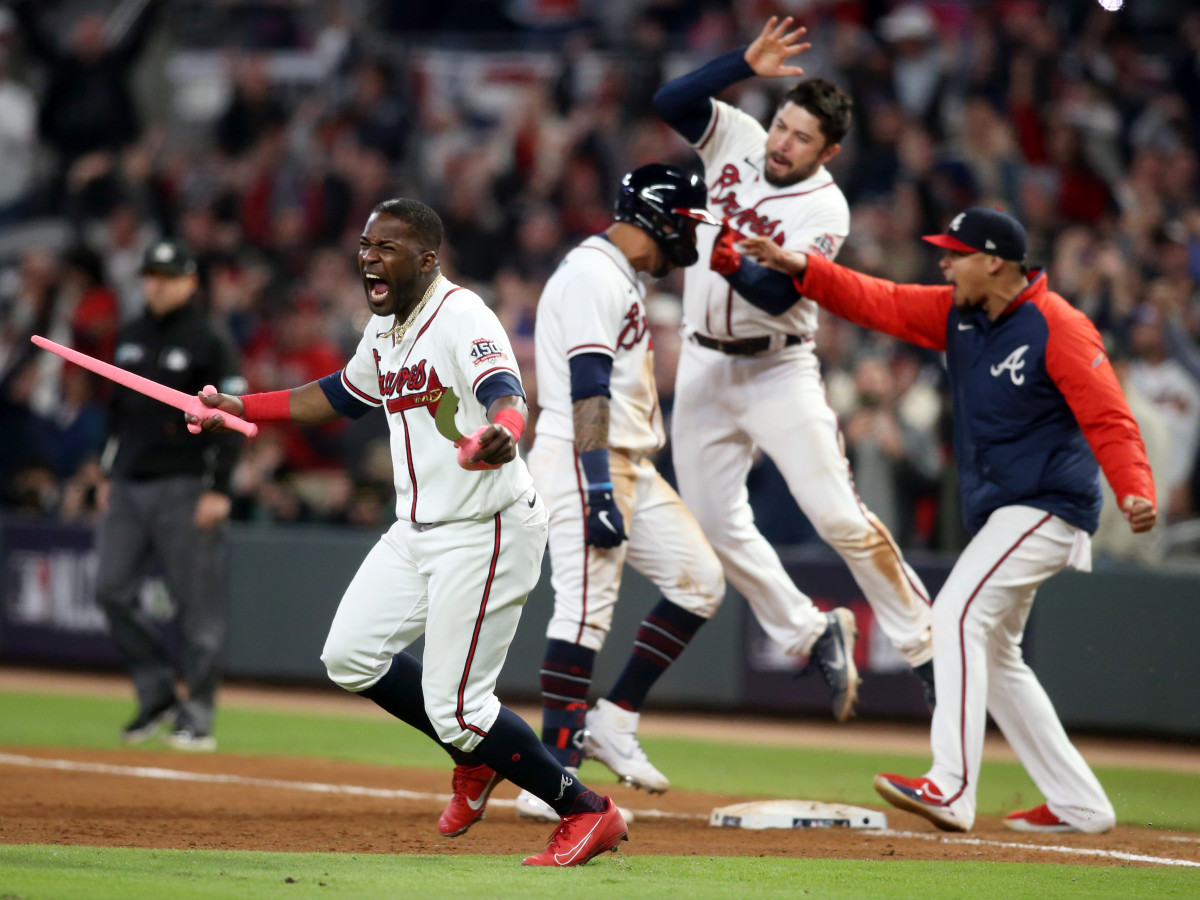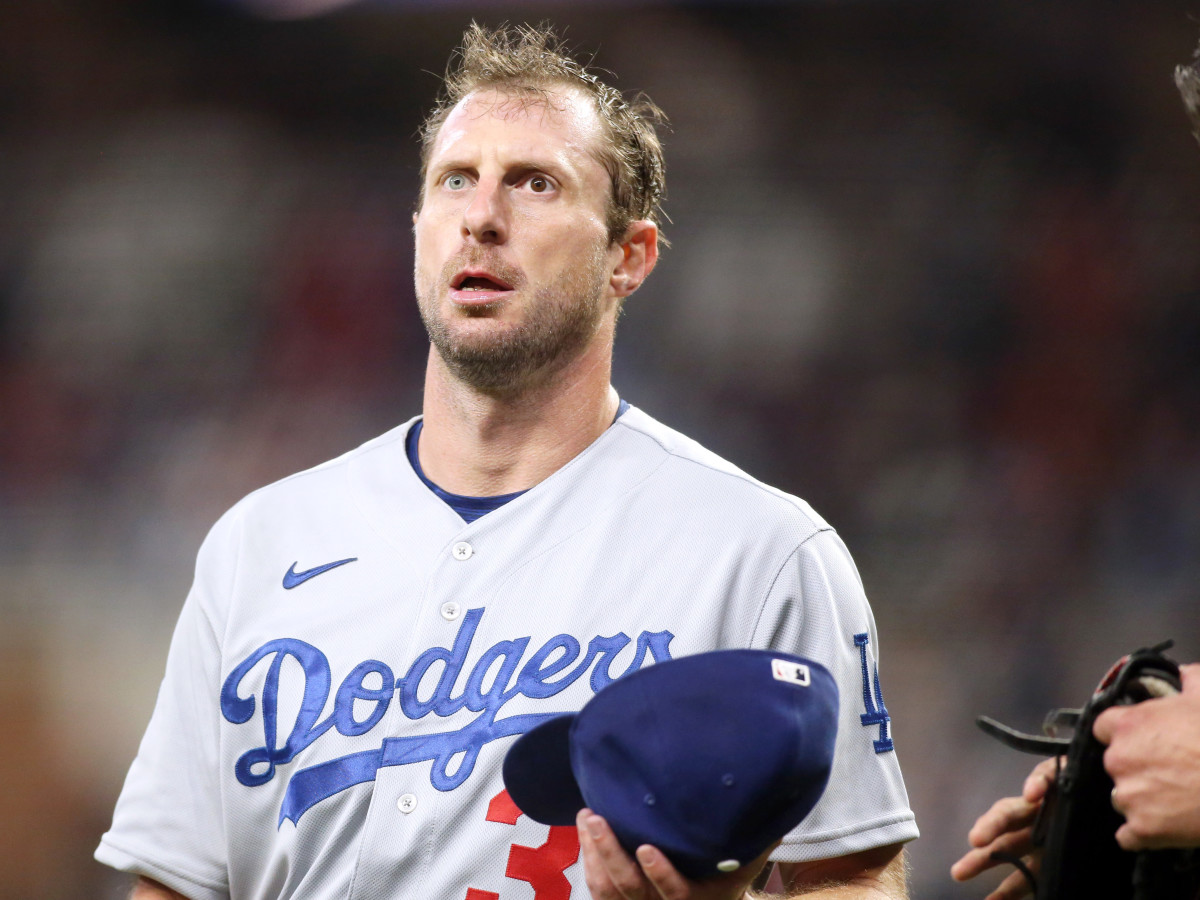The Complete Chaos of the Championship Series

It took only two games each for both the American League and National League Championship Series to diverge into complete chaos.
No specific formula can help us understand how we got here. We can’t retrace our steps back to the first pitch of the first game, or even the first pitch of the first playoff series, to figure out the first wrong turn. This isn’t one of those situations where one missing ingredient—It needs oregano!—can save the meal. It’s as if the four managers were going to a potluck, and for whatever reason, are now bringing something completely different from what they had promised.

Atlanta's Brian Snitker offered to pick up some napkins—a reliable though forgettable item—but decided to get some ice cream that was on sale at the supermarket, too. His greatest concern is whether it melts before they can enjoy it. Alex Cora is used to improvising in the October mayhem, so when he opened his fridge and saw a hodgepodge of leftovers, he made a stew. Dusty Baker wanted to make a quiche, only to realize the eggs were cracked.
And then there’s Dave Roberts. The L.A. manager started out trying to make a fruit salad and somehow, inexplicably, ended up with burnt meatloaf. It’s too late for him to start anew, so he now has to try and turn this thing into something digestible.
I outlined the Dodgers’ pitching problems in yesterday’s newsletter, and we go into more detail below, so I’ll refrain from weighing whether Roberts’s decisions were acts of desperation or necessity. But let’s just say things got much worse in L.A.’s 5–4 loss last night.
The Dodgers’ offense has stalled. They’ve scored six runs over the first two NLCS games and are 2-for-18 with runners in scoring position. L.A. hitters had the same trouble at the beginning of last year’s NLCS vs. Atlanta. The Dodgers dropped their first two games of that series, too, and scored eight runs in those losses before erupting for 11 in the first inning of Game 3. The situations aren’t entirely the same, though, mainly because L.A.’s pitching is in shambles. Maybe Mookie Betts, Corey Seager and the rest of the Dodgers hitters can order a couple of pizzas to bail out their manager and overworked pitchers.
Meanwhile, in the American League, Baker is not to blame for the Astros’ pitching woes. Injuries to Lance McCullers Jr. and Luis Garcia have really limited what their manager can do. Houston needed eight pitchers to win Game 1 and five to get through Game 2, which the Red Sox won. Boston also used eight arms in Game 1 and five in Game 2, though all of its starting pitchers remain healthy.
Overall, there have been 53 pitchers used across the four Championship Series games. That works out to 6.6 pitchers per team per game. Perhaps the most remarkable part of this is that none of the remaining four teams are the Rays.
Then again, look at the men leading three of the four teams’ front offices. Boston’s Chaim Bloom, Houston’s James Click and L.A.’s Andrew Friedman all came from Tampa Bay. The Rays’ Way might’ve been the plan all along, though it’s safe to assume none of them expected things would turn out like this.
And yet, here we are, two games into each series, the kitchens are filled with smoke and every alarm is sounding. The managers are scrambling to put out the fires, stir the sauces and make sure the bread rises. It’s all so frantic; it’s all so enthralling.
That’s the thing with these high-stakes cooking shows. For those of us enjoying the action from the comfort of our own homes, the competition is exhilarating. Even if our favorites falter and the losses sting, we’re not the ones who are going to get burned. Instead, we watch along, captivated, as the madness unfolds. It’s the chaos that makes it compelling.
Have any questions for our team? Send a note to mlb@si.com.

1. THE OPENER
If you want to know how the Braves edged the Dodgers in Game 2 last night, just read Stephanie Apstein’s column from Atlanta.
Here’s how she sums it up: “They won it by an inch or two past a shortstop’s glove, a degree or two off the angle of a throw, a finger or two ahead of a tag, a mile an hour or two of wind, a lace or two on that same shortstop’s glove. They won it by a Dodgers loss in April or May or June or July or August or September, by an ownership group looking to shed money, by a strained abdominal muscle.”
The most important takeaway? They won.
Read Stephanie’s entire story here.
2. ICYMI
Need to get caught up on the ALCS before tonight’s Game 3? We’ve got you covered:
The Art, Craftsmanship and Changeup Behind Correa's Masterpiece by Tom Verducci
What the shortstop accomplished in ALCS Game 1 against the Red Sox is one of the most difficult tricks for a hitter to pull off. And yet, he succeeded with so little room to triumph.
In Moving an Inch, Kiké Hernández Stands Among Giants by Tom Verducci
The Red Sox' center fielder is the postseason's breakout star, amid the complete chaos of the ALCS. That was evident again in Game 2.
Miss our excellent profile on Atlanta manager Brian Snitker from August? You can find that here:
He's Old-School. He Doesn't Do Analytics. And He's Thriving. by Chris Ballard
Braves manager Brian Snitker waited 40 years to get his shot. There may never be anyone like him again—and that may be exactly why he’s had so much success.

3. WORTH NOTING from Stephanie Apstein
After the Dodgers summoned ace Max Scherzer to close Game 5 of the NLDS against the Giants, manager Dave Roberts acknowledged that there could be fallout. “We knew going into this if we used him tonight, there might be a cost,” he said. L.A. paid that price in NLCS Game 2. Scherzer, who was already pushed back a day from Game 1, had hoped to be able to give the team a full, six- or seven-inning, 100-pitch start. But he realized while warming up that his arm was still tired from the relief appearance. Sometimes when that happens, he said, it can loosen up midway through the game. Last night, it didn’t. After the fourth inning, the pitcher who usually has to have the ball pried from his hand told Roberts he was nearly done. When Roberts came and got him two batters later, Scherzer said simply, “I gave it all I had.”
Now Los Angeles finds itself in danger of a similar situation. Roberts used scheduled Game 4 starter Julio Urías in relief in Game 2. The manager insisted that Urías will be fine. He may be. But that’s what they expected of Scherzer, too.
4. WHAT TO WATCH FOR from Emma Baccellieri
With a travel day for the NLCS, tonight’s only game is the ALCS in Boston, scheduled for 8:08 p.m. ET on FS1. The series is tied at one game apiece after the Astros’ close win in Game 1 and the Red Sox’ blowout Game 2.
For Houston, the biggest question is what they’ll be able to get from its pitching staff. After a short start from Framber Valdez in Game 1, Luis Garcia was pulled early with a knee problem in Game 2, and he was replaced in long relief by the man who was previously expected to start Game 4, Jake Odorizzi. (This is all made tougher to handle by the fact that Zack Greinke is not currently stretched out as a starter and Lance McCullers Jr. had to be left off the roster due to a right forearm injury.) That means that a bullpen game is probably in the cards for Game 4 or a potential Game 5—there simply aren’t enough pitchers here to work out anything else.
Which makes it critical that Houston can get some length from starter José Urquidy tonight in Game 3; into the sixth inning would be ideal. That’s typically a bar he can clear: He averaged 5.4 innings per start this season. Yet the team has been somewhat more cautious with him since he returned in September after a two-month layoff with a shoulder injury, and now, he hasn’t pitched since Oct. 3. It’s a delicate situation. But Urquidy’s ability to go deep tonight might be among the most crucial factors for the Astros’ success here.
The Red Sox, meanwhile, will have Eduardo Rodríguez on the mound. If they get another start from him like they did in Game 4 of the ALDS—when he struck out six over five innings and allowed two earned runs—they should be happy. Yet among their biggest questions is one about their offense: Both Rafael Devers (forearm) and J.D. Martinez (ankle) have been key contributors so far despite being banged up. Each hit a grand slam in Game 2, as if to put to rest any extant, lingering doubts about their statuses. Can they keep it up?
5. THE CLOSER from Emma Baccellieri
The Dodgers are trying to make it through this series with three true starters: Max Scherzer, Walker Buehler and Julio Urías. (While Tony Gonsolin can work as a starter—and often did over the course of the season—it seems clear that skipper Dave Roberts is envisioning him more as a bulk guy or long reliever in October.) It’s perfectly feasible to make it through a playoff run like this; Scherzer himself did it alongside Stephen Strasburg and Patrick Corbin to win the 2019 World Series with the Nationals. But it’s extremely difficult if you’re not able to count on getting length from your starters and, in turn, allowing for true rest in between outings.
That last part has proved tricky for the Dodgers so far. Scherzer started last night after closing out Game 5 of the NLDS; he was pulled in the fifth and said afterward that his arm had just felt dead. Roberts then turned to Urías to pitch the eighth inning despite the fact that he’s on track to start Game 4. His outing was short—14 pitches—and certainly doesn’t preclude him from starting Wednesday as planned. But it does point to how thin the margins for error are here. With a roster like this, it makes sense to maximize what you can get in each outing from your starters. The Dodgers haven’t exactly done that so far—and it seems like it will make it much harder for them to win.
That’s all from us today. We’ll be back in your inbox tomorrow. In the meantime, share this newsletter with your friends and family, and tell them to sign up at SI.com/newsletters. If you have any questions or comments, shoot us an email at mlb@si.com.
